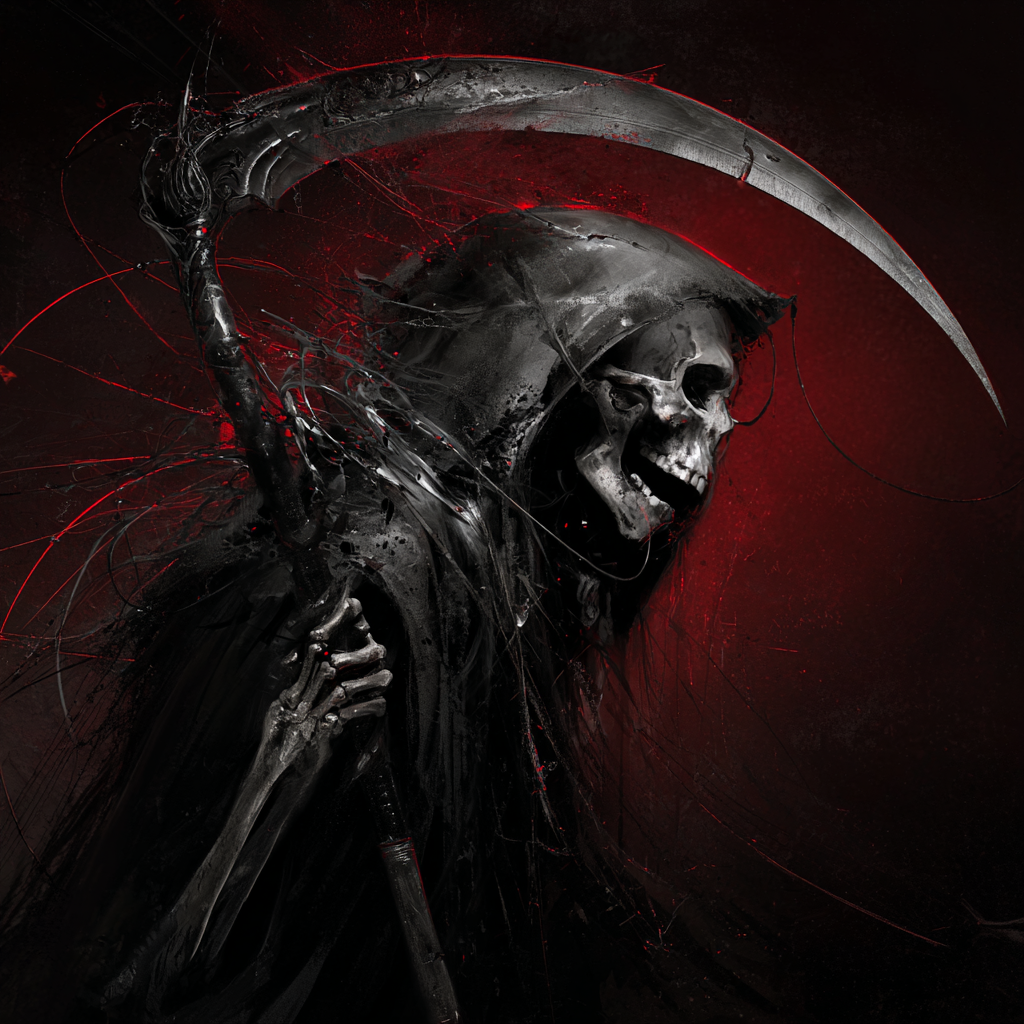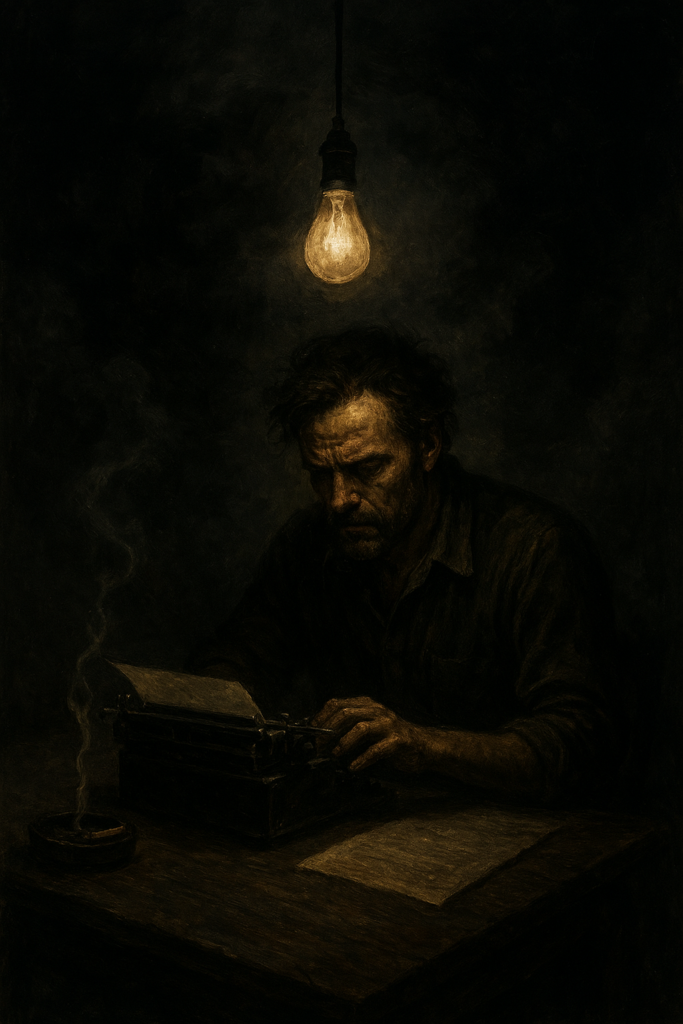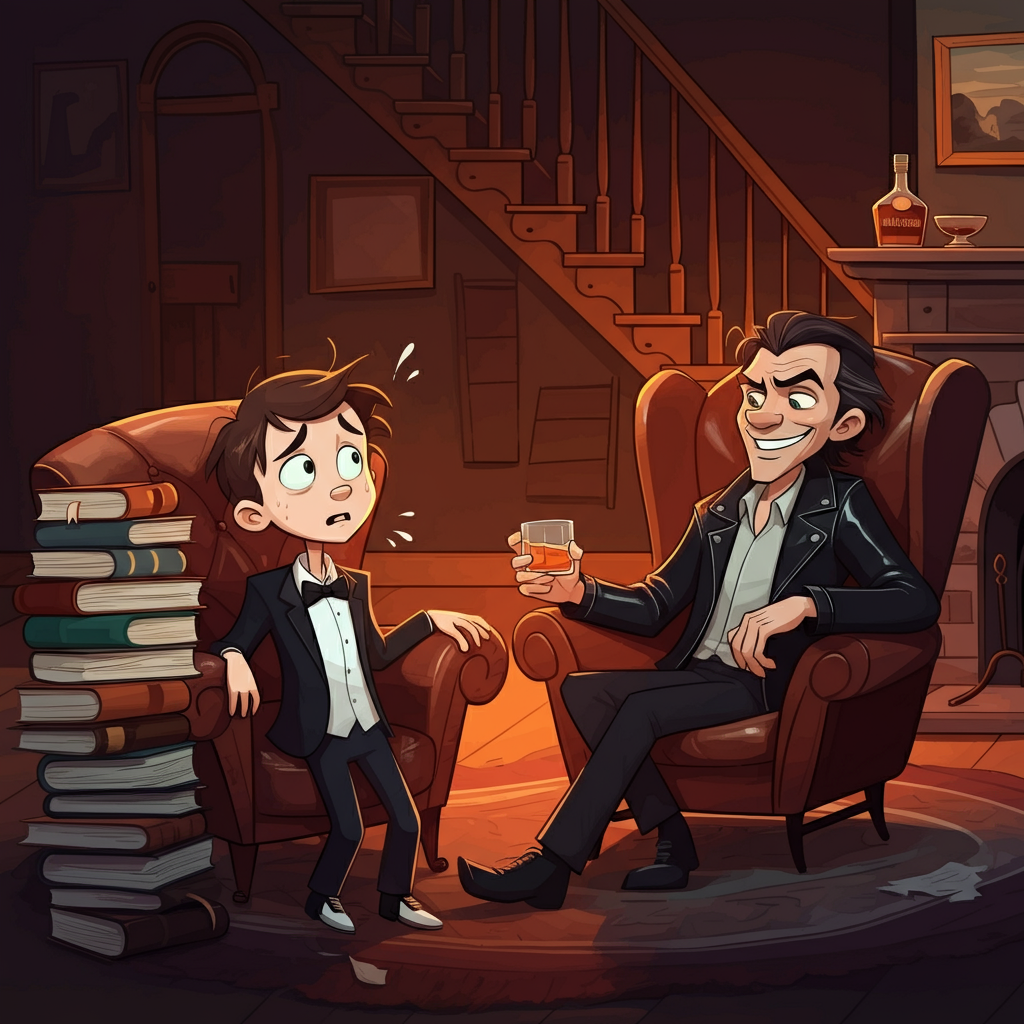N.P.: “Anniversary” – Duran Duran
November 29, 2025
There are dates, dear reader, that the hoople-heads circle on their calendars because they have to – tax day, their cousin’s third wedding, that annual check-up where their doctor tries to convince them that kale is a food group. On my calendar, days like November 29th are circled because back in 1898, Belfast coughed up a baby named Clive Staples Lewis, and reality’s been a little weirder ever since.
You probably know C.S. Lewis as the dude who invented Aslan and traumatized generations of kids with the idea that a wardrobe wasn’t just for mothballs and shameful outfits. But it was never just about wardrobe doors and talking creatures. Lewis took on the big questions – faith, loyalty, sacrifice – even cosmic terror. He banged out science-fiction trilogies about demonic planets and the fate of humanity, then casually dropped Mere Christianity, which proceeds to smash through 20th-century theology like a methamphetaminic rhinoceros on a Sunday stroll. To call him “the kindly uncle of children’s lit” is like calling Attila the Hun a “fun guest at brunch.” He was an intellectual brawler who stashed fables like napalm in the minds of children everywhere, stories that get dragged out every time there’s a debate about books corrupting the youth or saving their souls.
So raise a ridiculously oversized mug of tea to C.S. Lewis – the apocalypse-dreamer and literary disruptor. Celebrate a life that refused to shut the wardrobe door, even after seeing all the dark and dangerous thing crawling around inside.
N.P.: “Kayra” – Ummet Ozcan
November 28, 2025

I hope my dear reader had a great Thanksgiving. I certainly did. I LOVE Thanksgiving for myriad reasons, all of which are compelling and legitimate. But every November, like clockwork, the turkey hits the table and guilt-industrial complex revs its engines. The woke brigade, armed with hashtags and think-pieces, insists that Thanksgiving isn’t gratitude or family or stuffing-induced coma – it’s genocidal cosplay, colonial oppression reheated, white supremacy with cranberry sauce. Cue the headlines: The Washington Post calling the holiday “hemispheric violence,” Time branding it a “harmful lie,” and The Nation demanding we “decolonize” the mashed potatoes. Balls.
Sure, history is messy. Nobody sane denies that. But the annual ritual of progressive scolding has metastasized into a kind of performance art – an endless dirge where every bit of turkey is supposed to taste like original sin. The World Socialist Website even manages to turn gravy into a Marxist metaphor: billionaires swimming in cash while workers drown in AI pink slips. Meanwhile, activists petition newspapers to stop publishing Pilgrim accounts, as if the Mayflower Compact were Mein Kampf.
Well, fuck that.
Thanksgiving is not a seminar is grievance studies. It’s a day when America, in all its cracked, contradictory glory, sits down and remembers survival. The Pilgrims and the Wampanoag did share a meal. They did sign a treaty. They did cobble together the Mayflower Compact, which – whether you like it or not – was the first written constitution in the New World. That experiment in self-government eventually inspired the Declaration of Independence and the Constitution. That not propaganda…that’s history with teeth.
Thanksgiving is about grit, ingenuity, faith, and the stubborn refusal to fold. It’s about family, cooperation, hard work, and gratitude – the values that built this country. The woke bitching isn’t really about history; it’s about hating anything that celebrates America’s virtues.
Thanksgiving is a great day. A day to eat too much, argue with relatives, and remember that despite the chaos, we’re still here. The woke chorus can keep their dirges, their petitions, their performative shame. The rest of us will keep the turkey, the pie, the football, and the gratitude.
Because sometimes the most rebellious act in a culture of perpetual outrage is simply to say grace, pour another drink, and pass the goddamn turkey without an apology.
N.P.: “One Vision – Extended Version” – Queen
November 24, 2025

Crack Ho
Alright, but listen:
Gotta put it in my ass
Cuz my coochie itch
N.P.: “Fight To Survive” – Megatronix
November 23, 2025
On this day back in the gray flannel of 1990, Roald Dahl – twisted genius, not-so-subtle sadist, benevolent trickster – finally bought the proverbial farm. The man who gave us Matilda, The Witches, and James and the Giant Peach left behind a trail of Wonka Bars, oversized fruit, and gloriously terrified children.
Dahl was the kind of writer who understood that children are not fragile porcelain dolls that will crack under the slightest stress, but feral little anarchists who crave stories where adults are exposed as buffoons, tyrants, or monsters. He weaponized fairy-tale logic against the smug machinery of grown-up authority. His villains were fat-assed headmistresses, sadistic witches, greedy aunts, and bureaucratic swine. His heroes were children armed with wit, rage, and the occasional giant insect. He infiltrated the sterile, pastel-colored world of children’s books with the subtlety of a rhino in a dollhouse. He took the saccharine bullshit that passed for kid-lit and injected it with a bit of arsenic, then served it with a wink. He took the treacly pieties of conventional children’s stories, fed them to his private Oompa-Loompas, and had the little orange bastards sing mocking songs while the corpses were pulped into strawberry jam. Every Dahl book is a miniature morality play in which adults, those lumbering, flatulent, child-crushing tyrants, are ritually humiliated, mutilated, or explosively murdered for the entertainment of small readers. Miss Trunchbull swing-setted into oblivion. Augustus Gloop sucked up a chocolate river like a human Hoover. The Twits glued to their own ceiling. Bruce Bogtrotter forced to eat an entire cake until he turns the color of a bruised eggplant. This was revenge literature for eight-year-olds who already sensed that the deck was stacked against them by monsters in cardigans. Dahl’s particular brand of alchemy was to stare into the abyss of adult cruelty and then, with a manic grin, hand the kid a stick of dynamite. He taught me (along with all his other child readers who were paying attention) that grown-ups are more often than not idiots, that authority is usually questionable, and a little bit of magic and a whole lot of balls can change the whole goddamn world, all of which has been confirmed again and again in adulthood.
So tonight I’ll be raising a glass of something dark and viscous (probably the dregs of Willy Wonka’s chocolate river, with a dash of witch’s blood) to the nastiest, funniest, most unrepentantly vicious children’s writer who ever lived. The giants have stopped dreaming. The foxes are out of ideas. The BFG’s snozzcumbers will rot on the vine. Roald Dahl is dead. Long live Roald Dahl.
N.P.: “The Cult of Chaos – The Chaos of Cults Remix” – PIG, Rabbit Junk
November 22, 2025

There are dates that feel like cursed tattoos on the calendar, inked in blood and morphine and television static. November 22 is one of those days. A quadruple death day. A day when the literary cosmos and the political circus conspired to remind us that The Grim Reaper is the only editor who never misses a deadline.
☠️ Morning: Jack London Checks Out
Let’s start the clock in 1916. The morning breaks over a California ranch, and Jack London – the ur-American writer, the platonic ideal of living too hard and too fast – cashes in his chips. Age 40, which is basically toddler age for a writer who lived like a demolition derby. Checked out with a belly full of pain, a system screaming from uremic poisoning, and a little morphine to grease the final slide. He died broke but still the most famous writer on the planet. His last completed story, The Red One, is a savage cosmic horror tale that reads like Lovecraft on steroids. London’s exit is the kind of brutal punctuation mark that makes you wonder if the universe edits with a cleaver.
Afternoon: Aldous Huxley’s Psychedelic Curtain Call
Fast-forward to 1963, the year and the day the cosmic shit hit the fan. 2:20 p.m. PST out here on the West Coast, Aldous Huxley, the high priest of cerebral psychedelica who gave us Brave New World, has his wife, Laura, inject a final dose of LSD, and his last reported words are a whisper: “beautiful, beautiful.” He dies tripping, writing his own psychedelic postscript to a life spent mapping the outer limits of the human mind. Huxley’s wife later publishes the letter he wrote her from the edge, pure psychedelic literature composed while dying. It’s the kind of exit strategy that makes you wonder if death is just another altered state, a trip with no return ticket.
Evening: C.S. Lewis Slips Out Quietly
Meanwhile, across the pond in the quiet damp of an English afternoon, the clock hits 5:30 p.m. GMT. C.S. Lewis, the tweed-clad titan of Christian apologetics and the architect of Narnia, collapses and dies exactly one week after finishing Letters to Malcolm. The man who wrote The Problem of Pain – the definitive modern attempt to square a good God with a world of suffering – succumbs to renal failure. He dies while the world is too busy watching the leader of the free world get shot in the head. And for hours, nobody even notices.
His obituaries are a goddamn footnote, drowned out by gunshots and grainy film reels. It was like the Universe, in all its perversion, decided to bury a theologian and a president in the same frame just to see if anyone noticed. Of course, they didn’t.
The Shot Heard Around the Poets
And then there’s the main attraction, the centerpiece of the whole godforsaken day. JFK. Dallas. Dealey Plaza, the Zapruder film – the most analyzed text of the 1960s. Within hours, American poets start writing. Robert Lowell’s “Fall 1963.” Anne Sexton’s “The Assassination.” Sylvia Plath’s Ariel poems, and HST’s letter to Paul Semonin: “I am trying to compose a reaction to the heinous, stinking, shit-filled thing that occurred today.”
November 22 sits on the calendar the way a loaded revolver sits on a table.. Jack London in the morning, C.S. Lewis in the evening, JFK in the crosshairs. Yowza.
If I make it through the day, it’s not because I’m braver or smarter or more deserving. It’s because the Cosmic Editor hasn’t found a way to cut me yet. I look at today as a dare: live loud, write harder, and don’t flinch.
N.P.: “Don’t Crash” – Leæther Strip
November 18, 2025
Today has been ridiculous, dear reader. Started with coffee and a McRib. Things only went downhill from there. Still managed to work on the book a bit. I have to go fight a bunch of guys in a bit (training, of course), but after that, I’ll be glad to see this day in the rearview mirror.
But before I can put this day to bed, we have a bit of D.P.S. business. For you see, dear reader, on this day in 1865, Mark Twain – that literary, whiskey-soaked middle finger to Victorian decorum – published “Jim Smiley and His Jumping Frog” in the New York Saturday Press. It was a story about a frog. A frog that jumps. Or doesn’t. Depending on whether someone has secretly filled it with buckshot. And it is, in every sense that matters, the moment American literature stopped pretending to be British and started chain-smoking behind the barn.
The plot, such that it is, is a barroom anecdote nested inside a shaggy-dog story wrapped in some thick dialect. A man named Smiley, who bets on everything from horse races to the lifespan of parsons, trains a frog named Dan’l Webster to jump farther than any other frog in Calaveras County (which county is about 70 miles from where yrs. truly is presently parked behind the Dissolute Desk). Enter the stranger, the con, the existential cheap-shot: Dan’l gets sabotaged, stuffed with lead, and loses the bet. Smiley is swindled. The frog is betrayed. The reader is left somewhere between hysterical laughter and a creeping suspicion that the whole damn country runs on this kind of absurdity.
This story is a blueprint for the American psyche: the pathological gambler, the weaponized anecdote, the amphibian as metaphor for hope and humiliation. Twain’s genius here isn’t just the humor – it’s the architecture of the joke, the way he builds a cathedral out of frontier horseshit and then sets fire to it with a single punchline. This was a bit of a tectonic shift: our literature stopped being about noble suffering and starts being about the guy who loses his ass because someone cheated at frog-jumping.
This was Twain’s breakout. The moment the literary establishment looked up from its tea and said, “Wait, what the hell was that?” It was the sound of the West elbowing its way into the stodgy parlor, with muddy boots, crooked sneer, frog in hand.
So raise a glass to Dan’l Webster, the frog who couldn’t jump because he was full of lead. He is us. He is America. And Twain the guy in the corner, watching it all, scribbling furiously, and laughing like hell because he knows the joke is always on us.
N.P.: “Ain’t No Man Alive Can Handle Me” – Dumpster Grooves, Bertha Mae Lightning
November 16, 2025

Connectivity.
The internet’s an asshole.
Cloud cover too thick?
Hot damn, dear reader…there is light at the end of this long, circuitous, Byzantine, labyrinthine, and ludicrous writing process for the goddamn book. I’ll officially begin shopping it around for a deal in early ’26. Because 20 years between books is totally normal, right? My hopes are high, but I’m trying to manage my expectations. As always, I’ll be looking for Fuck You money for this thing, but what I’m really looking forward to, believe it or not, is finally being able just to talk about it. Having to maintain this Masonic air of secrecy around the whole project for all these years hasn’t necessarily been difficult, but it has been a pain in the ass.
Speaking of pains in the ass, today’s date – November 16th – appears to be a sort of nodal point in the chaotic, often self-immolating timeline of literary insurrection. Five seismic events, five big fuck-yous to the status quo, five reasons to believe that writing – real writing – is still the most dangerous thing you can do with your clothes on.
Exhibit A: We jump back to 1860, where a certain Fyodor Dostoevsky, fresh off a four-year sabbatical in the Czar’s least hospitable Siberian resorts and a mock execution…does my dear young reader even know what that is? Imagine this: you’re blindfolded, standing in front of a firing squad, heart jackhammering like a meth-addicted woodpecker, and just as the rifles rise – a reprieve. Not mercy, but bureaucratic sadism. That’s the crucible Dostoevsky crawled out of before he wrote The House of the Dead, serialized today in 1860 in Vremya magazine. Did you ever see HBO’s Oz? Well, this makes that look like Sesame Street. Russia banned it for “undermining authority,” which is apparatchik-speak for “telling a truth with a scalpel.”
Fast forward to Copenhagen, 1885. This guy August Strindberg stages Miss Julie. Class warfare, sexual humiliation, psychological evisceration – all in a goddamn kitchen. Strindberg directed it himself, then tore ass out of Sweden when he knew the pitchforks were coming. Critics called it “obscene,” which is rich coming from a country that invented IKEA. The Swedes banned it until 1906. But the damage was done: realism was dead, and theater would never be safe again.
Then 1938. The world is going dark, goose-stepping toward oblivion. Bertolt Brecht was holed up in exile in Denmark, fleeing the Gestapo with the ink still wet on his passport. Fear and Misery of the Third Reich dropped today in 1938 – 24 scenes of quotidian Nazi terror disguised as cabaret. It was agitprop performed in basements. The Nazis, in a stunning lack of self-awareness, burned the book in Berlin, providing the most ringing endorsement a writer could ever hope for.
Jump to 1952. Ernest Hemingway, holed up in Cuba and dodging the FBI between mojitos, publishes The Old Man and the Sea in a single issue of Life magazine. It was 72 pages of ruthlessly stripped-down, sunburned prose. He took a simple goddamn fishing trip and hammered it into a crucifixion myth. Five million copies sold in 48 hours. It was a cultural event, a literary knockout that won Papa the Pulitzer and, eventually, the Nobel. The man mailed the manuscript from a bar, probably bleeding from a marlin gaff and muttering about grace under pressure. Literature’s heavyweight champ, still swinging.
And finally, the cherry on this chaotic sundae: 1967. Our favorite Kentucky-born degenerate, Hunter S. Thompson publishes Hell’s Angels: The Strange and Terrible Saga. HST embedded with the Angels for a year, rode with them, drank with them, until the inevitable, teeth-shattering climax where they stomped him into the dirt. He lived the story, then wrote it while still bleeding, blurring the line between observer and participant until it ceased to exist. The book got banned for “glorifying violence,” which, like all the others on this list, meant it was simply too honest for the delicate sensibilities of the people in charge.
So here’s to November 16 – a date that reads like a rap sheet for the literary criminally insane. These were saboteurs, prophets, and beautifully deranged motherfuckers who made art dangerous again. If you’re not pissing someone off, you’re probably just typing.
Stay tuned. The book’s coming. And when it drops, I want it to be quite a fucking thing.
Light your cigarettes. Stockpile ammo. The storm’s coming.
N.P.: “Listen To My Voice” – Gary Numan
November 13, 2025

Today is a great day, dear reader. Not in the saccharine, Instagrammable, “live laugh love” horseshitty sense of the phrase, but in a way a thunderclap is great, or a freight train derailing into a fireworks factory is great – loud, messy, and absolutely unignorable. Today is a great day because the sky over Anhedonia County has finally cracked open like a long-suffering ulcer, hemorrhaging a steady, blessed rain onto the parched bones of The Creek. The gutters are gurgling like drunks in a confession booth, the air smells like wet asphalt and ozone, and the squirrels are losing their tiny minds. It’s glorious.
Second, and this is not a drill, today is November 13th, the birthday of Robert Louis Stevenson – patron saint of duality, chronicler of pirates, and the man who taught us that every respectable gentleman has a snarling, libidinal monster just beneath the waistcoat. Raise a glass of laudanum-laced absinthe in his honor, or at least mutter a curse at the mirror and see who blinks first.
But the third reason is the real meat of the matter, both literal and metaphysical. The McRib is back. Yes. That unholy slab of reconstituted pork slurry, shaped like a rack of ribs by someone who’s only ever seen ribs in a dream, slathered in a sauce so sweet it could double as embalming fluid. It’s back. And I, for one, have already eaten two. Possibly three. I blacked out somewhere between the second and the third and woke up with barbecue sauce on my collar and a vague sense of spiritual renewal.
There’s something about the McRib’s seasonal resurrection that feels like a pagan rite – like Persephone clawing her way out of the underworld, except she’s made of pork and corn syrup and corporate nostalgia. It’s a culinary Brigadoon, a meat mirage that appears just long enough to remind us that joy is fleeting, and then vanishes again into the marketing ether. You don’t eat a McRib because it’s good. You eat it because it’s back. You eat it because you’re alive, dammit, and because the rain is falling, and because Robert Louis Stevenson once wrote about a man who turned into a beast and you, too, feel the beast stirring when you smell that tangy, smoky perfume wafting from the Golden Arches.
So yes, today is a great day. The sky is weeping, the dead are remembered, and the McRib is back. It that’s not enough to make you howl at the clouds and dance barefoot in the mud, then brother, I don’t know what the hell you’re doing here.
Now go forth. Eat recklessly. Write dangerously. And if you see me in The Creek, sauce-stained and grinning like a pervert, just nod and keep walking. Some days are too good to explain.
N.P.: “Simple Life” – Elton John
Word of the Day: fard

Today’s Word of the Day is fard.
Verb – to apply cosmetics, especially to the face.
From Middle French farder, meaning “to paint or embellish,” which itself traces back to the Latin fardare, a verb that sounds like it should involve medieval jousting but instead refers to the ancient art of facial camouflage.
The doorbell chimes, a tinny, synthesized death knell signaling the arrival of The Proletariat. I swing open the door to find him vibrating on my porch: a human pimple in a shitty rented tuxedo, a creature of such profound adolescent awkwardness that his very existence is a form of passive-aggressive warfare against good taste. He’s wearing a clip-on tie and the kind of cologne that smells like Axe body spray had a baby with a urinal cake. He’s here to take my daughter to Homecoming, which is already a problem because she’s fifteen and he looks like the kind of kid who thinks Nietzsche is a Fortnight skin.
I let him in. I do not offer him a seat. I do not offer him water. I do not offer him mercy. We sit in silence. The kind of silence that makes your ears ring. He tries to smile. I stare at him like I’m trying to telepathically induce a nosebleed. His eyes dart around the room, landing on the towering stack of books and the half-empty bottle of bourbon on the mantlepiece. The silence stretches, thick and suffocating. I let it linger, a tactical weapon of my own design.
“So,” I begin, leaning back, a predator enjoying his work. “Homecoming. A veritable pageant of hormonal panic and shitty decisions. You must be thrilled.”
A sound escaped his throat, something between a gulp and a squeak. “Y-yes, sir. It should be fun.”
“Fun,” I repeat, savoring the word like a piece of cheap candy. “An interesting metric. Is the pursuit of ‘fun’ the primary driver of the human condition, do you think? Or is it merely a distraction, a fleeting palliative to soothe the existential dread that accompanies the slow, inexorable march to the grave?”
His face is a canvas of pure, unadulterated terror. His Adam’s apple bobs. “I…I don’t know, sir.”
What a moron. Time to really fuck with him.
After another minute of staring, I say, “So. You believe in free will?”
He blinks stupidly. Sheepishly. He blinks like a stupid sheep. “Uh. Yeah?”
“Interesting. So you think you chose to wear that tie?”
He looks down, confused. “My mom picked it.”
“Ah,” I say, nodding sagely. “So you believe in maternal determinism.”
He shifts in his seat. I can smell the panic. And his panic smells like fear and cheap deodorant.
“She’ll be down soon,” I say. “She’s upstairs farding.”
The kid freezes. His face goes from pale to a blotchy, horrified crimson. The single word hangs in the air between us, a foul and misunderstood specter
“She’s…she’s what?” he stammers, his voice cracking.
I lean forward, conspiratorially. “Farding. Oh, yeah. She fards all the time. Can’t stop, really. A terrible habit. I’ve tried talking to her about it, but she gets embarrassed. But it’s out of control. Sometimes it goes on for hours, the farding. She just didn’t want to do it in front of you. She’s shy about her farding.”
The boy’s brain, bless its undeveloped prefrontal cortex, has clearly gone to a very different, very gross place. He nods, but he’s not nodding like someone who understands. He’s nodding like someone who’s trying to pretend he didn’t just walk into a house where the father casually discusses his daughter’s alleged gastrointestinal habits with Socratic flair. I can see the frantic calculations behind his eyes, the dawning horror, the desperate search for an exit strategy. The silence returns, but this time it’s electric with his revulsion.
After a few more agonizing seconds that I enjoyed immensely, he shoots to his feet. “You know what? I…I just remembered. I have to…go. I think I forgot something at home, “he says.
“Was it your dignity?” I ask, cheerfully.
And with that, he was gone. A blur of cheap polyester and shattered dreams, fleeing my house, and, hopefully, my daughter, forever.
I walked to the bottom of the stairs, glass in hand.
“Honey!” I called up. “You can take your time! Your ride seems to have been unavoidably detained.”
My daughter descends the stairs, radiant and furious. “Where’d he go?”
He couldn’t handle your farding,” I say.
She groans. I pour myself a drink. I am victorious. And victory, dear reader, is a dish best served with a side of deliberate, weaponized vocabulary.
N.P.: “Cities in Dust” – Night Club